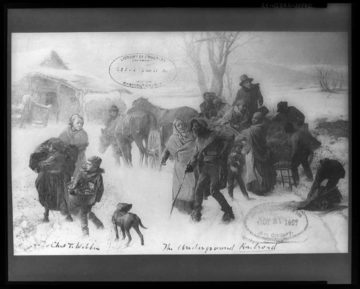Colin Dickey at Atlas Obscura:
 Even today, no one is even sure precisely where the name originated. Some have traced it to an account from 1839, when a young Black man was caught “lurking” around the Capitol in Washington, D.C.—when asked how he got there, he said that he had been sent north by a “railroad which went underground all the way to Boston.”
Even today, no one is even sure precisely where the name originated. Some have traced it to an account from 1839, when a young Black man was caught “lurking” around the Capitol in Washington, D.C.—when asked how he got there, he said that he had been sent north by a “railroad which went underground all the way to Boston.”
Through a loose network of formerly enslaved and free Black Americans, along with their white allies, thousands of enslaved Americans made their way north in the decades before the Civil War, moving sometimes surreptitiously, sometimes out in the open, on railways and ships, in wagons and freight, toward freedom. It is impossible now to know for certain how many people made their way out of slavery on the Underground Railroad; both supporters and detractors had an investment in embellishing its impact. In the North, abolitionists dramatized the plight of those seeking refuge and to play up their own heroic efforts. In the South, enslavers argued that the Underground Railroad was nothing short of a grand conspiracy of subversive lawbreakers—the higher the numbers, the greater the threat to the country.
more here.
